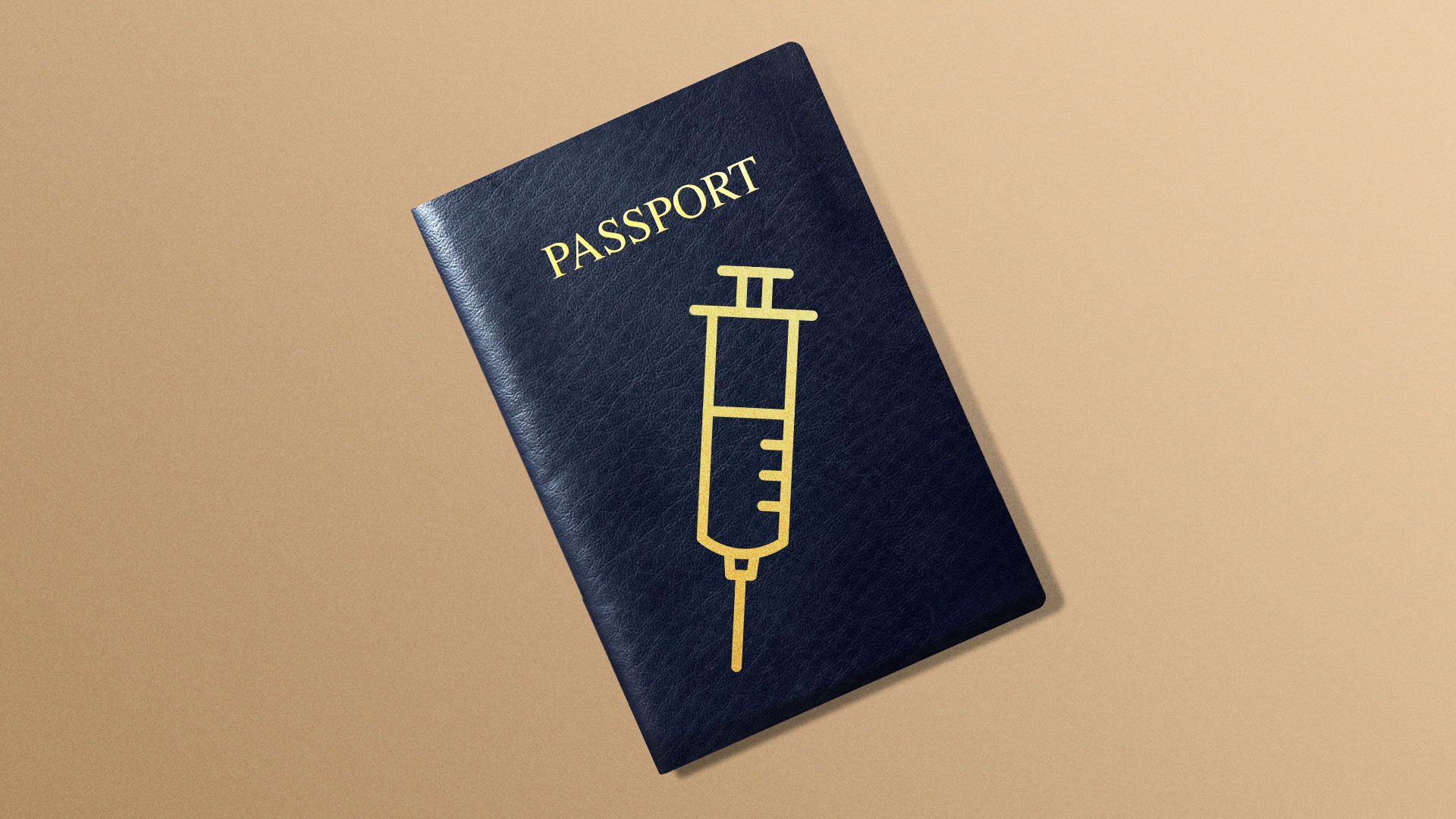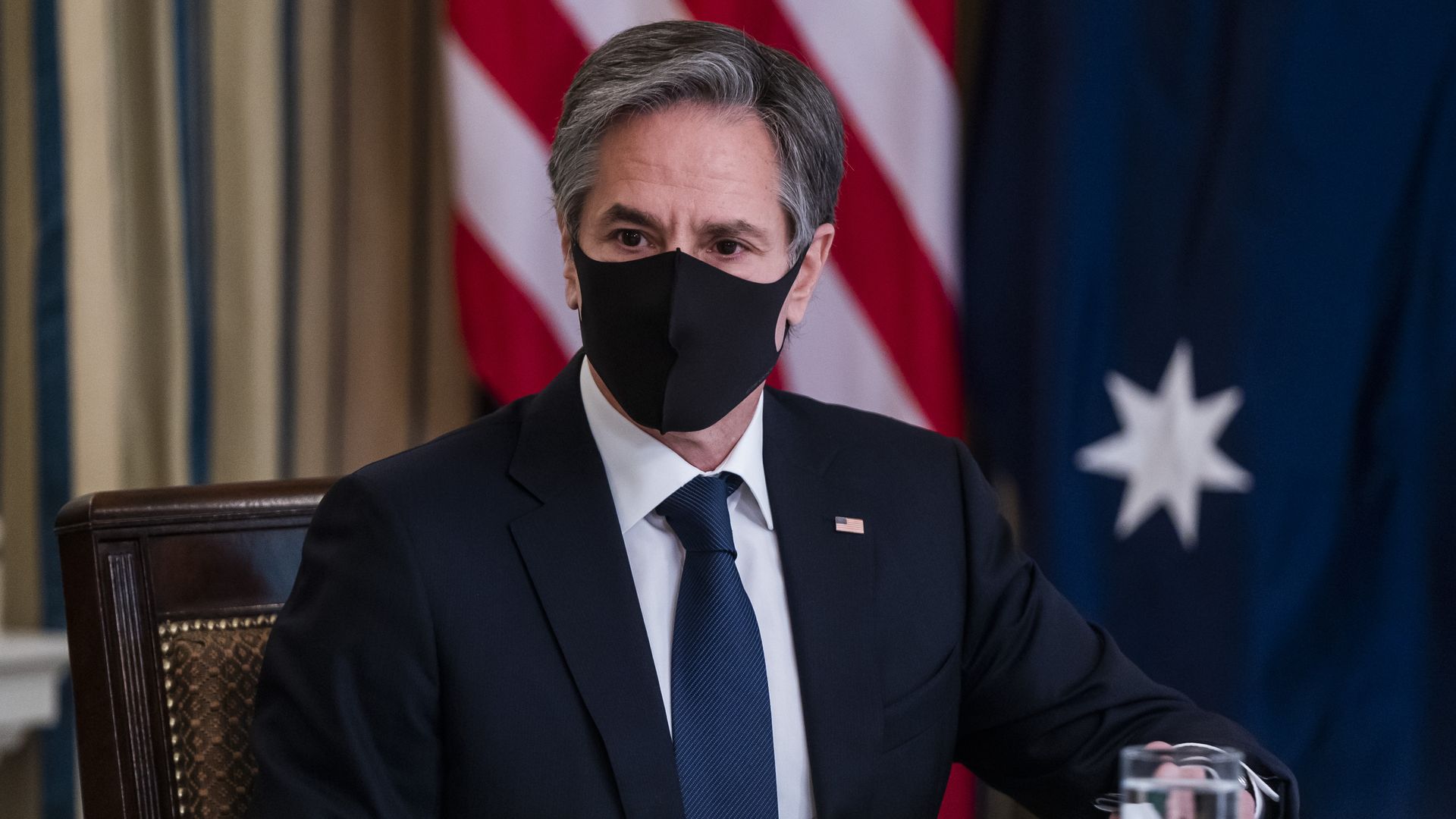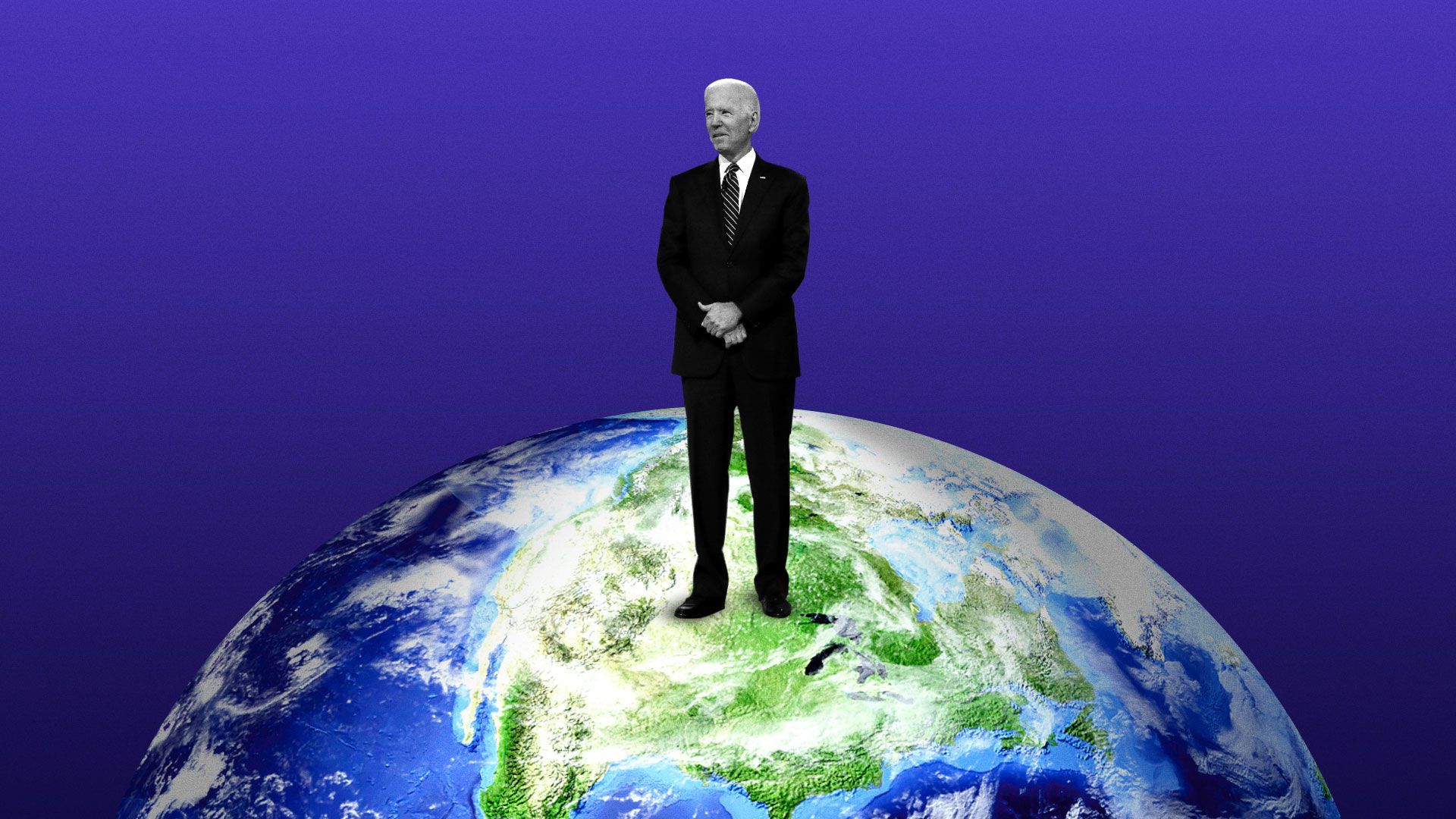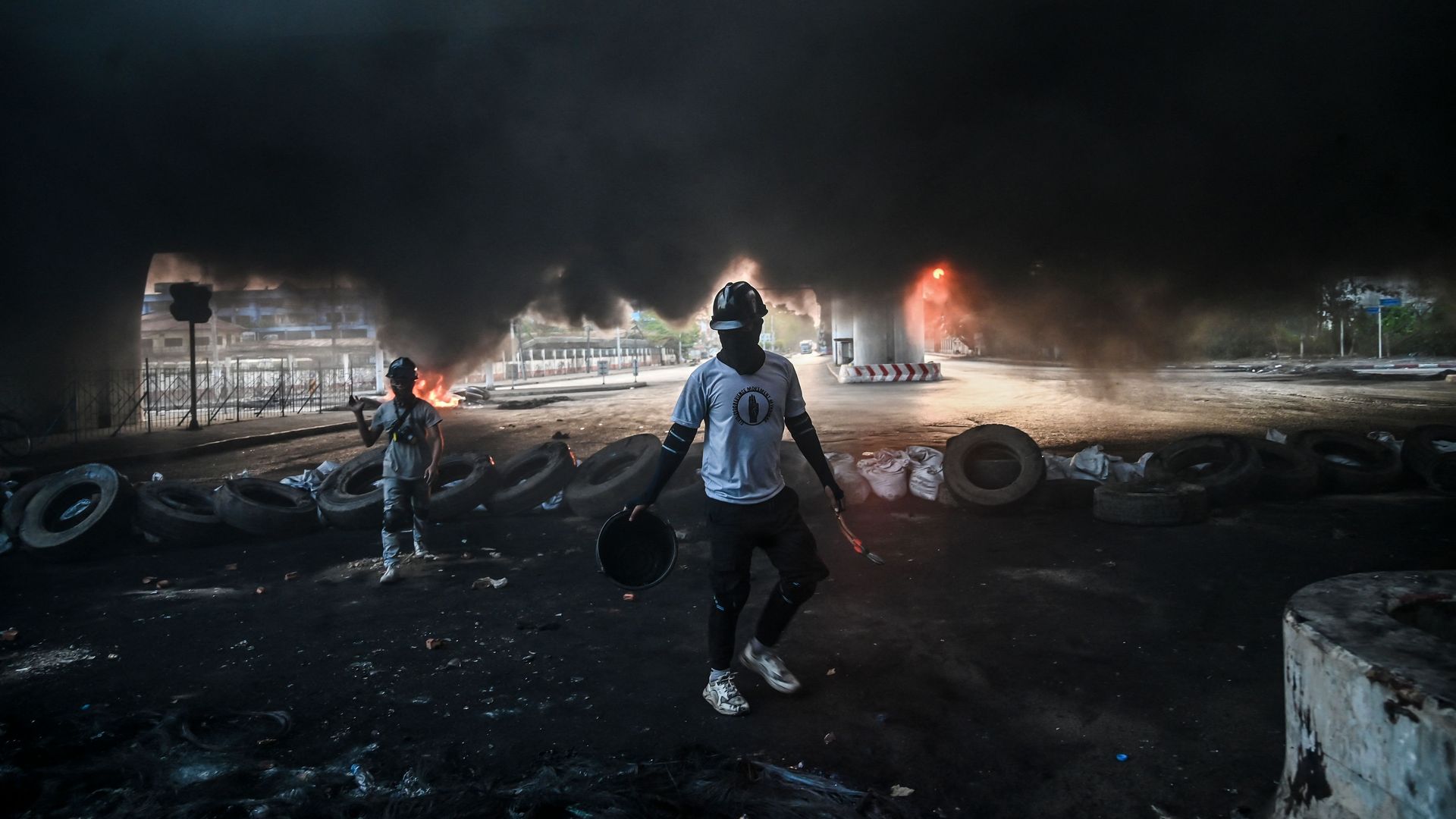| | | | | | | Presented By Babbel | | | | Axios World | | By Dave Lawler ·Mar 18, 2021 | | Welcome back to Axios World. - Tonight we're donating some vaccines, holding a big meeting in Alaska and getting into a debate with Vladimir Putin (1,800 words, 6½ minutes).
- Thanks for reading World. Please tell a friend to sign up.
| | | | | | 1 big thing: Where the vaccines are coming from |  The Biden administration today took a modest first step toward sharing coronavirus vaccines with the world, announcing that it intends to send 1.5 million AstraZeneca doses to Canada and 2.5 million to Mexico. Why it matters: AstraZeneca's vaccine hasn't been approved in the U.S., and the White House has faced growing criticism for sitting on doses that could be used elsewhere. - The deal comes in the form of a loan, with the U.S. sending doses to Canada and Mexico now with the expectation that they will return doses to the U.S. later this year.
- Canada and Mexico have lagged far behind the U.S. in terms of vaccinations. Both countries lack domestic production capacity, so they're reliant on imports that have been slow to arrive.
The big picture: The world has four major sources of coronavirus vaccines: China (33% of all doses produced), the U.S. (27%), the EU (19%) and India (13%), according to data shared with Axios by Airfinity, a science information and analytics company. - While China has exported around 60% of the vaccines it has produced — in part due to a low sense of urgency in China, where the virus is largely under control — the U.S. has exported 0%, focusing instead on covering all U.S. adults.
- India has exported 65% of its production to date, per Airfinity, but the CEO of the country's largest producer said last month that he'd been "directed to prioritize the huge needs of India."
- The EU is having a vigorous debate about whether to more tightly control exports, lamenting what it sees as an imbalance with the U.S. and U.K., which signed contracts with manufacturers guaranteeing them priority access to vaccines produced within their borders.
The trends: The U.S. is increasing production particularly quickly, which should continue as the J&J and AstraZeneca shots come on line, according to Airfinity senior analyst Matt Linley. - The EU is also rapidly increasing its output as Pfizer production scales up (Pfizer is being produced in Germany, and AstraZeneca in Belgium and the Netherlands).
- Indian production is off to a slower start, in part because of delays with the AstraZeneca shot, but should be second only to China in terms of overall output by the end of the year.
- Russia has made deals to sell the Sputnik V vaccine all over the world, but it lacks the production capacity of the other major players.
- Brazil and Australia should be next on line, producing Sputnik V and AstraZeneca, respectively. There is currently no production taking place in Africa.
What's next: Countries around the world will continue to push for access to the vaccines the U.S. is producing — including some of the 1.3 billion doses purchased by the U.S. government — particularly after today's announcement set a precedent for dose sharing. Worth noting: The European Medicines Agency confirmed today that the AstraZeneca vaccine is "safe and effective," advising the EU countries that had temporarily blocked it due to blood clot fears to resume distribution. |     | | | | | | 2. EU moves toward vaccine passports |  | | | Illustration: Eniola Odetunde/Axios | | | | The EU unveiled its proposal for vaccine passports this week, offering the most detailed picture yet of how international travel might resume in the coming months. Why it matters: People are desperate to travel, and tourism-reliant countries like Greece are desperate to receive them. Vaccines should provide a path out of closed borders and mandatory quarantines, but there's no universal way to track who has actually been vaccinated. Driving the news: The EU "Green Certificate" — available in digital or paper form — would allow all EU residents to prove that they've been vaccinated, recently tested negative, or already recovered from COVID-19. The aim is to roll out the passports before the summer travel season. - The European Commission suggests that those who've had an EU-approved vaccine be free to cross borders without any quarantine requirements.
- People from outside the EU, including Americans, could also potentially benefit from the system when traveling to Europe.
Yes, but: Some EU members, including the Czech Republic and Hungary, are using Chinese or Russian vaccines, which won't automatically be covered by the passport. - It's also not clear how long immunity lasts or how effective vaccines are at preventing transmission, further complicating the passport picture.
- There are also ethical concerns about opening up travel to people fortunate enough to be vaccinated when access varies so widely around the world.
But some airlines and airports are already starting to roll out a global platform called CommonPass, which allows people to digitally document their COVID-19 status — through test results and, eventually, vaccinations — while protecting their health data privacy, Axios transportation correspondent Joann Muller notes. - Several other such systems are currently in development.
What to watch: While vaccine passports have a clear application in international travel, it's less clear if and how they'll feature in day-to-day life. - Israelis can already show a QR code at bars, gyms and theaters to reveal their vaccination status and enter if they've received both doses.
- But the barriers to such a system being widely rolled out in the U.S. are probably too high, Axios' Bryan Walsh writes.
|     | | | | | | 3. U.S. and China expect a frosty first meeting |  | | | Blinken attends a virtual summit with the leaders of the U.S., India, Japan and Australia. Photo: Jim Lo Scalzo/EPA/Bloomberg via Getty | | | | Secretary of State Tony Blinken and national security adviser Jake Sullivan will hold several hours of meetings in Anchorage, Alaska, this evening and tomorrow morning with China's top diplomats, Yang Jiechi and Wang Yi. What to watch: Both sides are expecting a frosty affair and playing down expectations of any breakthroughs. On the eve of the meetings... - Blinken announced sanctions on 24 officials for undermining Hong Kong's autonomy.
- China's Foreign Ministry blasted the "Cold-War mentality" and efforts to form an "anti-China clique" by the U.S. and Japan in response to a joint statement from Blinken's visit to Tokyo.
- The Federal Communications Commission moved to revoke the licenses of two Chinese telecom firms to operate in the U.S. on national security grounds.
What they're saying: The White House briefed reporters ahead of the Alaska trip that the decisions to host the first meeting on U.S. soil and have both Blinken and Sullivan in the room came at their insistence. - "We've seen a track record from China in the past of attempting to play favorites within an administration and in particular to play the secretary of state and national security adviser off each other," a senior U.S. official said.
- "The games that China has played in the past to divide us or attempt to divide us are simply not going to work here."
The other side: "Tactically, Xi's goal for his diplomats is to buy as much time as possible in the short term by enmeshing the relationship in a complex of dialogue mechanisms while the relative balance power continues to move more decisively in Beijing's favor," former Australian Prime Minister Kevin Rudd writes for Axios. What to watch: Depending on the outcome of the meetings, Beijing plans to propose a virtual Xi-Biden summit next month on climate change, the WSJ reports. That's just about the only issue on which both leaders are prepared to cooperate. |     | | | | | | A message from Babbel | | How Babbel trains your brain to learn a new language | | |  | | | | Unlike other apps that use machine learning to teach you languages, Babbel takes a human-based approach. What this means: Lessons are built by over 150 linguists and prepare you for situations you'll actually encounter in real-life. No random words or abstract grammar. Sign up and get 50% off. | | | | | | 4. U.S. foreign policy roundup |  | | | Photo illustration: Eniola Odetunde/Axios. Photo: Spencer Platt/Getty Images | | | | 1. Vladimir Putin has essentially challenged Biden to a TV debate today after Biden agreed in a TV interview that Putin was a "killer." What he's saying: "I want to propose to President Biden to continue our discussion, but on the condition that we do it basically live, as it's called, without any delays and directly in an open, direct discussion." - Moscow responded to Biden's remark by recalling its ambassador to Washington to "analyze what needs to be done in the context of relations with the United States."
- Earlier this week, the Office of the Director of National Intelligence released a report finding that Putin authorized influence operations in 2020 aimed at denigrating Biden's candidacy, supporting former President Trump, undermining public confidence in the election, and sowing divisions.
- One of the few aspects of U.S.-Russia collaboration that was still working, space travel, is now fraying too, Axios' Miriam Kramer reports.
2. Biden has dispatched Sen. Chris Coons to Ethiopia to express his "grave concerns" about the crisis in Tigray to Prime Minister Abiy Ahmed. The backstory: Abiy's offensive to depose rebellious leaders in the northern region yielded military success but a humanitarian catastrophe. - Abiy's government has denied Blinken's accusation that "ethnic cleansing" is taking place in Tigray.
- The latest: Blinken announced $52 million in U.S. aid today to help with the crisis. But there's growing speculation that other U.S. aid to Ethiopia could be cut.
3. A North Korean diplomat said Wednesday that Pyongyang had rejected attempted outreach from the Biden administration and would continue to do so until Washington changes its policies. What they're saying: As Blinken and Defense Secretary Lloyd Austin visited Seoul this week, Kim Jong-un's powerful sister, Kim Yo-jong, warned the U.S. against "causing a stink" if it wanted peace. - In Seoul, Blinken called on China to help convince North Korea to give up its nuclear weapons.
- What to watch: The U.S. is bracing for a potential resumption of North Korean missile tests, Politico reports.
|     | | | | | | 5. Africa: Power changes hands in Tanzania |  | | | Photo: Ericky Boniphace/AFP via Getty | | | | Samia Suluhu Hassan will be sworn in on Friday as Tanzania's first female president, replacing the late President John Magufuli. Driving the news: Vice President Hassan announced Magufuli's death on state TV on Wednesday, saying he'd died of a heart condition. Speculation had been swirling that Magufuli — one of the world's most powerful COVID-deniers — had contracted the coronavirus. - Nicknamed "the Bulldozer," Magufuli initially won international praise following his election in 2015 for his efforts to combat corruption and develop infrastructure. More recently, he drew criticism for COVID-denial and political repression.
- Magufuli rejected vaccines and said the country had defeated the virus through prayer.
- As Magufuli was only just re-elected (in an election marred by crackdowns on critics), Hassan will serve nearly a full five-year term.
What to watch: Hassan, a 61-year-old Muslim from Zanzibar, didn't spend much time in the public eye in her five years as Magufuli's vice president. - "For those who were kind of expecting a breakaway from the Magufuli way of things, I would say hold your breath at the moment," Thabit Jacob, a Tanzania expert at Roskilde University, said in an interview with Democracy in Africa.
- Jacob says Hassan lacks a strong base within the ruling party and will be "very much controlled by some of the dominant Magufuli factions," at least initially.
- But there might be an opportunity to change direction when it comes to the coronavirus response, Jacob says.
|     | | | | | | 6. Middle East: UAE revokes Netanyahu's invitation over election rhetoric |  | | | Election posters in Jerusalem showing Netanyahu (R) and his political rivals with the slogan "Only the Likud will form a full right-wing government." Photo: Ahmad Gharabli/AFP via Getty. | | | | The UAE canceled plans to host Israeli Prime Minister Benjamin Netanyahu in Abu Dhabi to protest his attempts to use Crown Prince Mohammed bin Zayed (MBZ) as a prop in his campaign, Axios' Barak Ravid reports. Why it matters: This is the first big crisis between the UAE and Israel since the announcement of the normalization of relations last August. - The Emiratis are furious at Netanyahu for entangling them in domestic Israeli politics.
- The last straw was an interview in which Netanyahu claimed MBZ "volunteered" to invest $10 billion in Israel. Netanyahu even claimed MBZ told him he believes in his economic leadership.
- The Emiratis denied that any decision had been made on investments, said publicly that they did not want to be involved in "internal electioneering in Israel," and made clear to Netanyahu that he was no longer welcome to visit before the elections on March 23.
- Read the full story
Go deeper: Israeli election preview |     | | | | | | 7. Stories we're watching |  | | | Protests continue in Yangon, Myanmar. Photo: STR/AFP via Getty | | | - China's mission to dominate space internet
- Brazil's Bolsonaro appoints 4th health minister of pandemic
- Senate confirms China expert Katherine Tai as trade rep
- Democrats see China as a test for bipartisanship
- Inside the U.S.-Israel talks on Iran
- Uber to reclassify 70,000 U.K. drivers as workers
- Biden tells Central American migrants: "Don't come over"
Quoted: "There are a lot of killers. You think our country's so innocent?" — Donald Trump in 2017, responding to a question about Putin being a "killer." After Biden responded to a similar question by agreeing that Putin was indeed a killer, Putin made a very similar argument to Trump's about the U.S. |     | | | | | | A message from Babbel | | How to learn a new language in three weeks | | |  | | | | 73% of Babbel users said they could have a simple conversation in their new language after just 5 hours of lessons. The reason: The language app makes it easy with bite-sized lessons, so you can spend less than 15 minutes a day learning language skills you'll remember. Sign up today and get 50% off. | | | | | | Axios thanks our partners for supporting our newsletters.
Sponsorship has no influence on editorial content. Axios, 3100 Clarendon Blvd, Suite 1300, Arlington VA 22201 | | | You received this email because you signed up for newsletters from Axios.
Change your preferences or unsubscribe here. | | | Was this email forwarded to you?
Sign up now to get Axios in your inbox. | | | | Follow Axios on social media:    | | | | | |










No comments:
Post a Comment